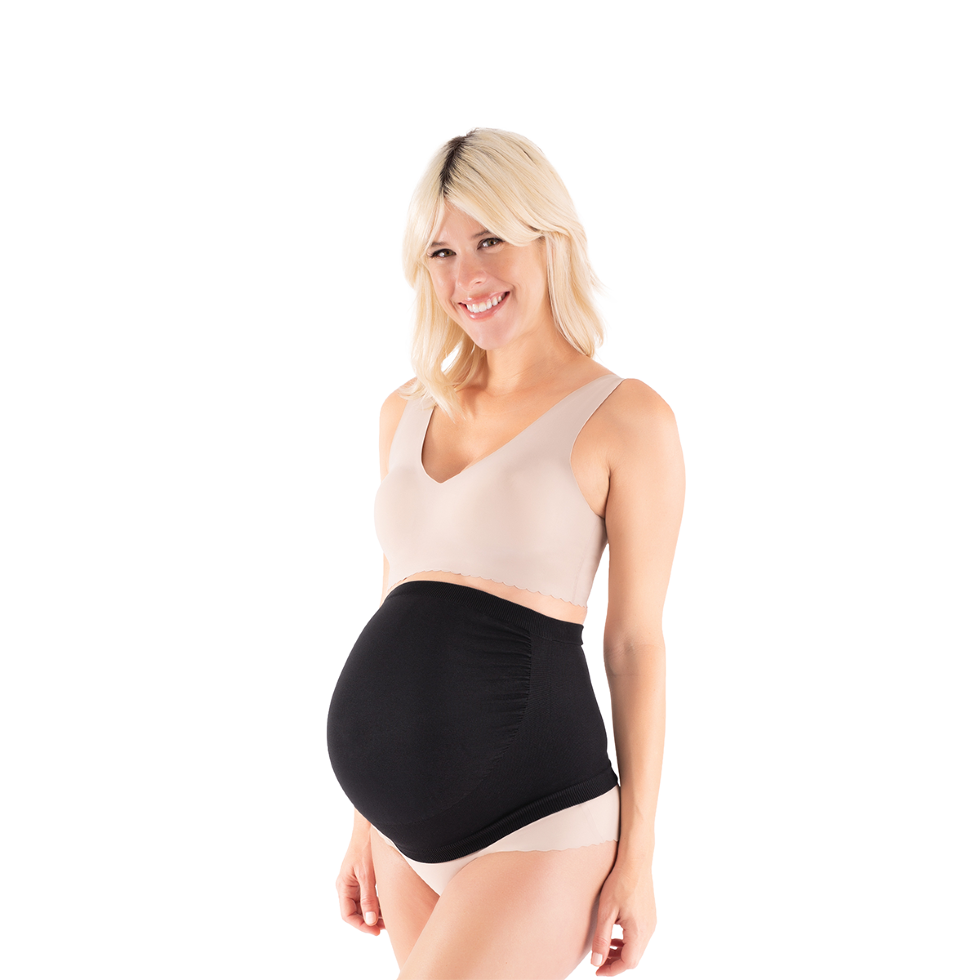![]()

For so many of us, the moment we hit our second trimester in pregnancy, we start wondering, when can you feel the baby kick? and what does baby kicking feel like? It’s such a unique (and also weird but awesome) part of pregnancy. And it’s a special moment when you realize for the first time, that no, that isn’t just your stomach rumbling—the baby really is kicking inside your womb.
Fast forward a few weeks and there will be no space left for doubt. In fact, it very well may feel like those baby kicks are strong enough to throw you off balance.
Diana Spalding, MSN, CNM, midwife and Motherly’s Maternal Health Advisor shares that babies move in the womb starting very early in pregnancy, but it takes a little while before the baby is big enough for you to feel the movement. “Some people can start to feel baby kicks at 16 weeks, but often it happens later than that, maybe at 20 weeks or so.” If you are ever worried about your baby’s movement, talk to your provider right away.
It turns out that in addition to being a cute little “hello!” from your little one, baby kicks serve a very important purpose in fetal development.
Here’s some fascinating science behind those adorable baby kicks.

Researchers have proven you aren’t just unsteady on your feet: Those little baby kicks really are incredibly forceful.
According to a report published in the Journal of the Royal Society Interface, researchers from the Imperial College London were able to determine how strong fetus’ kicks are by modeling the movements captured with imaging technology.
Using this original process, they found fetuses kick with up to 6.5 lbs. of force at just 20 weeks gestation—meaning those little legs you see on the anatomy ultrasound are strong enough to give a ball a good kick!
10 weeks later, the babies hit their peak gestational fitness with up to 10.5 lbs. of force in their leg movements. Although babies do keep getting stronger from there, they start running out of space. By 35 weeks, the force drops off again to 3.8 lbs.
“This increasing trend with gestational age is important because changes in fetal movement patterns in late pregnancy have been linked to poor fetal outcomes and musculoskeletal malformations,” the researchers say in their conclusion, adding they hope that confirming this link will inspire “future research in tissue engineering and mechanobiology.”
Not only are those kicks strong, but they are purposeful: Those little exercises are helping babies develop their neuromuscular systems to prepare them for the outside world. (Even if they can’t hold their head up at birth.)
In the earlier days of moving and grooving, Niamh Nowlan, a bioengineer at Imperial College London, says the movements are likely just reflexes rather than actions ordered by the baby’s brain. But as the weeks go on, babies begin to get deliberate about when, why and how they move.
“The baby needs to move [in the womb] to be healthy after birth, particularly for their bones and joints,” Nowlan tells Live Science, explaining fetal movement is linked to lower rates of congenital disorders such as shortened joints and thin bones.
On your end, the kicks and jabs are also good signs that the baby is doing well in there, which is why many prenatal health practitioners recommend tracking your baby’s kicks once a day. However, from her experience with her own two babies, Nowlan says the actual sensation of a baby kicking can differ from pregnancy to pregnancy.
“I could always tell where my son’s feet were, whereas that wasn’t really the case for my first,” she explains. Because the feeling can vary for a variety of reasons, Nowlan and her team are conducting research on a wearable fetal movement monitor that they developed, which could bring peace of mind to expectant parents.
Today those not-so-little kicks may be keeping you up at night, but soon enough they will be supporting a crawling, walking and running kiddo—so that pre-season training goes a long way.
[This post was originally published on February 15, 2018. It has been updated.
Getting ready for your little one’s big debut? Check out some of our favorite new mama must-haves in the Motherly Shop!
Motherly’s Pregnancy Wellness Class
This is the pregnancy wellness class you have been looking for. Expert-driven and woman-centered, The Motherly Pregnancy Wellness Class celebrates the wonder of this amazing transition by providing the physical, nutritional and mental support you need, while also frequently asked questions about relationship + sex, baby necessities and maternity leave planning.
‘The Motherly Guide to Becoming Mama’
This is the pregnancy book we wish we’d had when we first became mothers—a mama-centered guide that doesn’t just focus on your baby’s needs, but honors and coaches you through this profound life change.
Belly Bandit belly boost
Need to provide an extra layer of support for your growing baby bump? Or want to protect your clothing from belly oils and creams during pregnancy? The Belly Boost has got your back (and your front).
S.O.S Sleep-On-Side Pregnancy Pillow
Smushy-soft, comfy foam pillows support your pregnancy belly as well as your back so that you can sleep on your side in a position that promotes optimal blood flow to your uterus, and optimal comfort for you.
We independently select and share the products we love—and may receive a commission if you choose to buy. You’ve got this.
Todays Parent
Today’s Parent is Canada’s #1 source for parenting content that informs, inspires and builds a sense of community. We help parents celebrate the happy chaos that comes with having a family and remind them that they are not alone. If you’re trying to conceive, pregnant or have children from newborn to ages 9+, you’ll get insightful information for all ages and stages on discipline, health, behaviour, education, plus easy and nutritious recipes and so much more.




